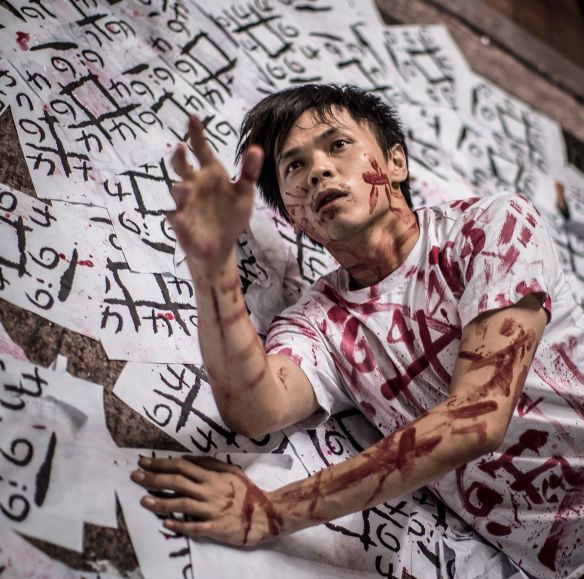NORMAN, OK—An international jury has selected the Hong Kong poet Xi Xi 西西 (born 1937) as the winner of the sixth Newman Prize for Chinese Literature. She is the third female Newman laureate, and the first from Hong Kong.
Sponsored by the University of Oklahoma’s Institute for U.S.-China Issues, the Newman Prize is awarded biennially in recognition of outstanding achievement in prose or poetry that best captures the human condition, and is conferred solely on the basis of literary merit. Any living author writing in Chinese is eligible. A jury of seven distinguished literary experts nominated seven poets this spring, and selected the winner in a transparent voting process on October 9, 2018.
Winner Xi Xi 西西 (the pen name of Zhang Yan 張彥) will receive USD $10,000, a commemorative plaque, and a bronze medallion at an academic symposium and award banquet at the University of Oklahoma, Norman, on March 7–8, 2019. In addition to this year’s nominating juror, Tammy Lai-Ming Ho (Hong Kong Baptist University), other nominees and jurors include Yu Xiuhua 余秀华, nominated by Nick Admussen (Cornell University); Wang Xiaoni 王小妮, nominated by Eleanor Goodman (Fairbank Center, Harvard University); Xi Chuan 西川, nominated by Lucas Klein (University of Hong Kong); Xiao Kaiyu 萧开愚, nominated by Christopher Lupke (University of Alberta); Zheng Xiaoqiong 郑小琼, nominated by Maghiel van Crevel (Leiden University); and Bei Dao 北岛, nominated by Wang Guangming (Capital Normal University).
“This year’s nominees represent an extraordinarily wide variety of Sinophone poetry,” said this year’s Newman Prize Coordinator, Jonathan Stalling. “The jurors spent over an hour in vigorous deliberation before they finally emerged with one poet out of the many. It is genuinely exciting to see Xi Xi’s poetry and her lifelong contributions to world letters recognized by this year’s prize.”
According to Dr. Tammy Lai-Ming Ho,
Hong Kong literature has for too long been relegated to a secondary position, or even worse—it is as though the city is incapable of producing significant literary works and writers of note. Hong Kong poetry is to many perhaps an even more abstract and chimerical concept. Xi Xi’s poetry, at times whimsical and at times serious, speaks to the character of the city and its people. Her poems also demonstrate how stories of a city can be told through narratives that are at first glance insignificant, allegories and fairy tales instead of grand statements. Feminine, tender, witty, observant, and capable of tugging at the heartstrings, Xi Xi’s poetry reminds us Hong Kong poetry should not be ignored in any discussion.
Previous winners of the Newman Prize have included mainland Chinese novelists Mo Yan 莫言, Han Shaogong 韩少功, and Wang Anyi 王安忆, who won the 2009, 2011, and 2017 Newman Prizes, respectively. Mo Yan went on to win the Nobel Prize in Literature in 2012. Taiwanese poets Yang Mu 楊牧 and novelist and screenwriter Chu Tien-wen 朱天文 won the Newman Prize for Chinese Literature in 2013 and 2015.
The Newman Prize honors Harold J. and Ruth Newman, whose generous endowment of a chair at the University of Oklahoma enabled the creation of the OU Institute for US-China Issues over a decade ago, in 2006. The University of Oklahoma is also home to the Chinese Literature Translation Archive, Chinese Literature Today, World Literature Today, and the Neustadt International Prize for Literature.
美國中部時間2018年10月8日,中國香港作家和詩人西西獲得第六屆紐曼華語文學獎(詩歌獎)。她是紐曼華語文學獎的第三位女性獲獎者,也是第一位來自香港的獲獎者。
紐曼華語文學獎是由美國俄克拉荷馬大學美中關係研究院於2008年設立的獎項,是美國第一個為華語文學或詩歌設立的獎項,每兩年頒獎一次。評委們完全基於文學價值選出為最能表現人類生存狀況作品。所有在世的用中文寫作的作家都有機會入選。諾貝爾文學獎得主莫言是2009年年首位紐曼文學獎得獎者,中國大陸作家韓少功和王安憶分別於2011年和2017年折桂,台灣詩人楊牧和台灣作家朱天文分別在2013和2015年領此殊榮榮。
紐曼華語文學獎的七位專家評審早在今年年初提名了七位詩人。今天,他們經過六輪投票,決定出最終得獎者。獲獎者西西(原名張彥)可獲得一萬美元的獎金,紀念獎牌一塊,銅質獎章一枚,並將受邀於2019年三月7日至8日參加在俄克拉荷馬大學舉辦的紐曼學術研討會和晚宴。西西的提名者是香港浸會大學的何麗明教授(Tammy Lai-Ming Ho)。另外六位評委和被提名的詩人信息如下:康奈爾大學的安敏軒(Nick Admussen)提名了詩人於秀華,哈佛大學費正清中心的學者顧愛玲(Eleanor Goodman)提名了詩人王小妮,香港大學的柯夏智(Lucas Klein)教授提名了詩人西川,阿爾伯塔大學的陸敬思(Christopher Lupke)教授提名了詩人蕭開愚,萊頓大學的柯雷(Maghiel van Crevel)教授提名了詩人鄭小瓊,以及北京首都大學的王光明教授提名了詩人北島。
今年紐曼華語詩歌獎評委團的組織者石江山(Jonathan Stalling)說,“本次被提名的詩人們代表了華語詩歌極度豐富的多樣性。”“評委們經過一個多小時的熱烈的評議和投票才選出了最後的勝者。西西的詩歌和她畢生對文學的貢獻在今年的紐曼文學獎上得到了肯定,這是一件真正激動人心的事“。
何麗明博士在提名詞中寫道:“很長一段時間以來香港文學都被視為是次要的,甚至有人認為這個城市不能出產重要的文學作品或著名的作家。香港詩歌或許在很多人眼中是個更抽象和虛妄的概念。西西或諧或莊的詩歌道出了這個城市及其居民的品格。她的詩歌也證明了一個城市的故事不必是宏大的敘述,而可以是表面瑣碎的絮語,寓言或者童話。西西的詩歌陰柔,纖細,機智,敏銳,動人心弦,無可辯駁地宣示著香港詩歌的存在感“。
紐曼華語文學獎的主辦方美國俄克拉荷馬大學美中關係研究院於2006年成立。該學院的成立與Harold J. Newman和Ruth Newman夫婦的慷慨捐贈密不可分。俄克拉荷馬大學還設有中國文學翻譯檔案館,“今日中國文學”雜誌,“今日世界文學”雜誌,並定期主辦紐斯塔特(Neustadt)國際文學獎。









